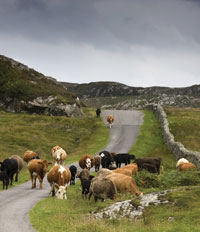Producers urge Europe not to interfere with LFA support

The European Commission is to issue a discussion paper on the future of Less Favoured Areas support within the next two weeks following the European Court of Arbiters’ conclusion that some countries are playing fast and loose with LFA rules.
European Agriculture Commissioner Mariann Fischer Boel told Scottish upland farmers gathered round a farmhouse kitchen table in Glenlivet, Banffshire, that the LFA’s Mountainous and Island designations would be unaffected by the review, but the “Intermediate” designation – the one which relates to 85% of Scotland – was up for discussion.
And she warned it was now up to individual governments to justify to Europe how these areas could continue to receive aid.
“I understand the huge significance of this discussion for regions like this and I don’t underestimate the risk if animals leave,” she said.
“But we need a system which we can defend and which can’t be attacked by the core of voters. That is why I have come to Scotland to see with my own eyes exactly what the situation is here.”
The dozen or so farmers gathered round the table responded to Mrs Fischer Boel’s call for frankness by warning her not to interfere with LFA support and insisted that, without the payments, rural communities would be decimated because cattle and sheep would disappear from the hills even faster than now.
They argued that their farms faced the hardship of a seven-month winter, and lamented the bright sunshine and mild weather which marked her visit.
The farmers reminded the commissioner that 2.7% of suckler cows and 7.7% of breeding sheep had gone in the last year and warned that, if the trend continued over 10 years, a third of all cows and three-quarters of ewes would disappear. That, they said, was an alarming situation and couldn’t be allowed to happen.
But Mrs Fischer Boel batted the problem back to the Scottish Government and Cabinet Secretary for Rural Affairs Richard Lochhead, who was sitting next to her at the kitchen table.
“My officials would be happy to help the authorities in Scotland create a system to alleviate the pressure on the loss of animals,” she said.
“You could use Article 68 to tailor make measures which would have some effect as they would be coupled payments.”
Mr Lochhead agreed the Scottish industry had to have the difficult debate over using the controversial option which has already been rejected by NFU Scotland.
But he emphasised it was quite a separate discussion from LFA support.
His deputy agriculture director David Barnes said later he was relaxed about the commission’s challenge to justify LFA in Scotland, arguing that his department would be able to fight the cause from a scientific stance.
“We could even reclassify some areas as mountainous or island, but I don’t believe it will be necessary,” he added.
